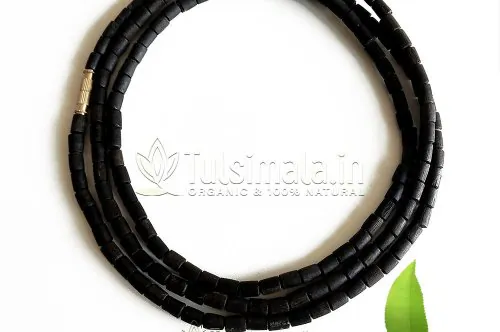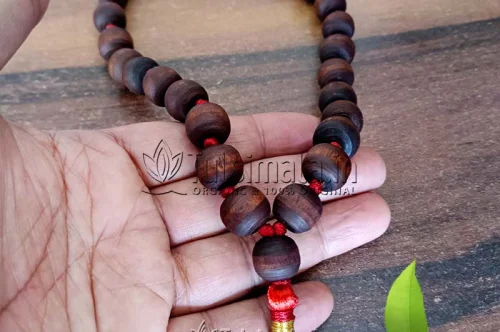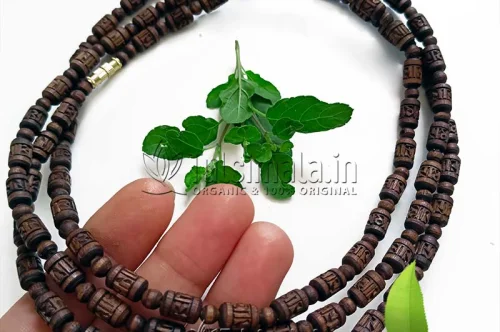BOTANICAL IDENTITY OF TULSI MALA & TULSI JAPA MALA

Tulsi Kanthi Mala from Vrindavan India Shop Now
The Tulsi Mala is found quite commonly all over the Indian sub continent. The plant can grow in the wild in the tropical warm regions. The plant’s height varies from 2 to 4 feet. The flowering season is winter (December to February). The Tulsi leaves have a marked strong aroma and an astringent taste. There are some biologically active compounds like urosolic acid, luteolin and apigenin that can be extracted from the Tulsi leaves.
Though it is the leaves that are usually used the flowers, seeds and roots also find good usage. There are two main varieties of Tulsi- the dark variety or Krishna Tulsi and the light variety or Rama Tulsi. The Tulsi has also got a close cousin- the Thai Basil. This is smooth and hairless unlike the Tulsi that is slightly hairy.
Besides the Thai basil has a strong aniseed or licorice smell while the Tulsi or Holy Basil has a hot and spicy flavor that is comparable to the flavor of the clove.
Other names :
It is known as Holy Basil in English and Tulasi in Sanskrit. Other names used for the Tulsi are Manjari, Krishna Tulsi, Trittavu, Tulshi and Thulsi. Description: Tulsi is a heavy branched having hair all over. It attains the height of about 75 – 90 cm. It has round oval shaped leaves which are up to 5 cm long.
The leaves are 2- 4 cm in length. Its seeds are flat. Its flowers are purple – creamish in colour. The Tulsi with the green leaves is called the Shri Tulsi and one with the reddish leaves is called the Krishna Tulsi. Its seeds are yellow to reddish in colour. Leaves of Tulsi contains very essential oil.
Other species of Tulsi:
Ocimum canum (Ram tulsi or Kali Tulsi)
Ocimumbasilicum
Ocimum Kilmand
Ocimum scharicum
Ocimum Sanctum.
Tulsi in your home:
The Tulsi plant, like most herbs, is a delicious way to enhance the flavor of your cooking, or make an excellent tea. This sub-shrub looks quite attractive in a decorative pot, is not harmful to animals and it is fairly easy to grow. Even outside of its medicinal properties, the Tulsi plant can make a great addition to your household either in
your spice rack or in your garden.
Note: Buy original tulsi mala by visiting our website www.tulsimala.in or you can click the below links
 English
English Hindi
Hindi








